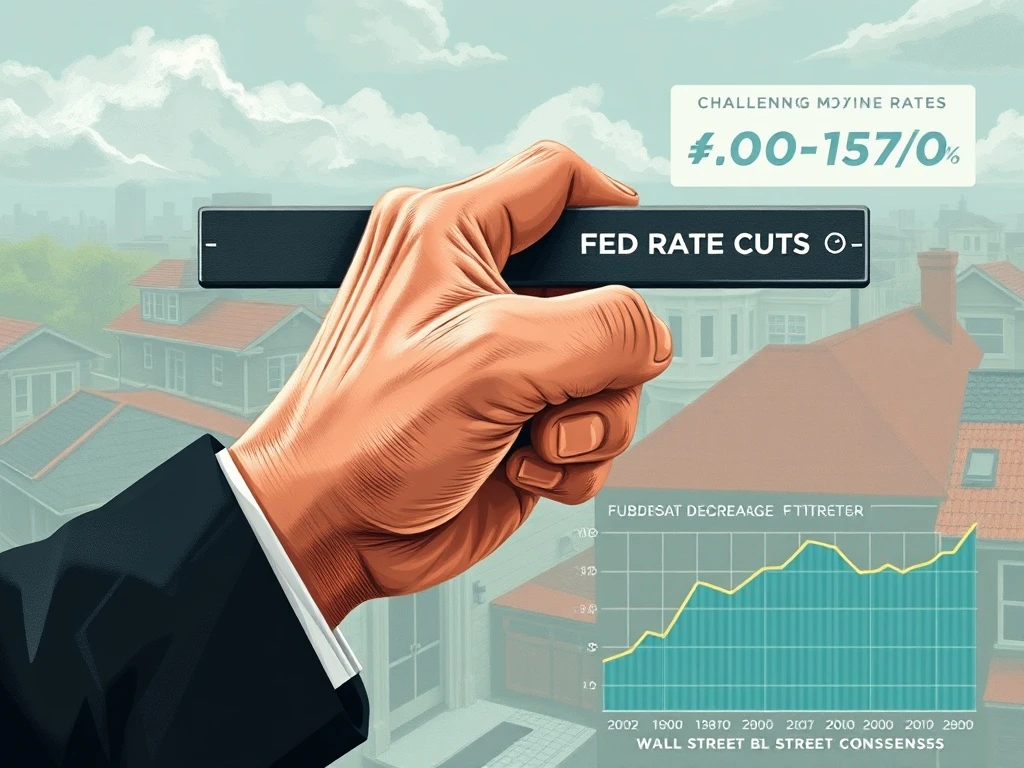Fed Rate Cuts: BlackRock CIO Issues Urgent Call to Stabilize Housing for 5.5 Million Households

In the dynamic world of finance, where every major institutional move sends ripples across markets, BlackRock, the world’s largest asset manager, has just dropped a significant statement. Their Chief Investment Officer, Rick Rieder, is making headlines with a bold call for the Federal Reserve to implement immediate Fed rate cuts. For anyone watching the cryptocurrency space, understanding these macro-economic shifts is crucial, as they often dictate investor sentiment and capital flows. BlackRock’s position challenges the prevailing cautious sentiment on Wall Street, signaling potential shifts that could impact everything from housing to digital assets.
Why BlackRock’s CIO Demands Urgent Fed Rate Cuts
BlackRock’s Rick Rieder isn’t just suggesting; he’s publicly advocating for the Federal Reserve to act decisively on interest rates before the next FOMC meeting. His core argument centers on alleviating the mounting pressure within the housing sector and combating persistent inflationary forces. This stance notably diverges from the broader Wall Street consensus, which often leans towards a more hawkish or at least cautious approach to monetary policy.
- Easing Housing Burdens: Rieder emphasizes that high borrowing costs are creating a “dangerous tightness” in the economy, particularly in housing. Lowering rates could directly reduce mortgage burdens, making homeownership more accessible.
- Stimulating Demand: A reduction in rates is expected to stimulate demand in a housing sector that has been stifled by elevated interest rates, potentially revitalizing construction and sales.
- Addressing Inflation: While counter-intuitive to some, BlackRock believes that easing housing costs could indirectly help manage inflation by reducing one of the key drivers of household expenses.
This institutional push amplifies market speculation, as investors and policymakers alike brace for decisions that could fundamentally reshape financial dynamics.
Unpacking the Strain on the Housing Market
The current state of the housing market is a central pillar of BlackRock’s argument. Affordability has become a significant challenge for millions, with high mortgage rates pricing out potential buyers and renters alike. Imagine the impact of a 6% mortgage rate reduction; industry estimates suggest this could make housing more accessible for approximately 5.5 million households. This isn’t just a number; it represents families struggling to find stable housing or afford their current homes.
The strain is visible in several indicators:
- Reduced Sales Volume: High rates have led to a slowdown in home sales, impacting real estate agents, builders, and ancillary industries.
- Increased Rental Costs: As homeownership becomes less attainable, demand for rentals surges, pushing up rental prices and further squeezing household budgets.
- Investor Behavior Shifts: Rising fiscal deficits have driven billions of dollars into corporate debt, indicating a waning confidence in government bonds. This trend underscores a growing appetite for higher yields, often found in riskier assets, as concerns about prolonged high rates persist.
BlackRock’s analysis suggests that without intervention, the housing sector could remain a drag on broader economic recovery.
BlackRock CIO: A Lone Voice or a Harbinger of Change?
Rick Rieder, as the BlackRock CIO, holds significant sway in financial circles. His public advocacy for rate cuts, while diverging from some Wall Street peers, resonates with broader concerns about economic fragility. BlackRock’s position isn’t just a casual observation; it reflects a strategic bet on the necessity of policy flexibility to prevent a prolonged economic slowdown.
What makes BlackRock’s intervention so impactful?
- Influence: As the world’s largest asset manager, BlackRock’s pronouncements carry immense weight, often shaping market sentiment and even influencing central bank thinking.
- Data-Driven Analysis: Their call for easing stems from a comprehensive assessment of deteriorating housing affordability and persistent inflation, backed by their vast data and analytical capabilities.
- Institutional Demand: Rieder’s remarks reflect intensifying institutional demands for a more accommodative monetary policy, especially from firms managing large portfolios that benefit from lower borrowing costs and stimulated economic activity.
The Fed’s response will undoubtedly be watched closely, as Rieder’s intervention highlights the influence of such institutional voices in shaping monetary debates.
How Lower Mortgage Rates Could Transform 5.5 Million Households
The direct and immediate impact of lower mortgage rates cannot be overstated. For millions of households, a reduction in borrowing costs could be the difference between renting indefinitely and achieving homeownership, or simply easing the financial burden of their existing mortgages.
Consider these potential transformations:
- Increased Affordability: A 6% reduction in mortgage rates, as highlighted, could significantly lower monthly payments, making home purchases feasible for a vast segment of the population currently priced out.
- Stimulated Refinancing: Existing homeowners could refinance their mortgages at lower rates, freeing up disposable income for other expenditures, which in turn stimulates broader economic activity.
- Boost to Consumer Confidence: Reduced housing costs often lead to higher consumer confidence, encouraging spending and investment across various sectors, including potentially a renewed interest in risk assets like cryptocurrencies.
While the Fed prioritizes inflation control, the potential benefits to household finances and the broader economy from lower mortgage rates are substantial.
Navigating Economic Stability: The Fed’s Delicate Balance
The Federal Reserve’s decision-making process is a delicate balancing act, particularly when aiming for long-term economic stability. While BlackRock’s push for easing aligns with certain market pressures, the central bank has historically prioritized inflation control above all else. Chair Jerome Powell is expected to highlight trade tensions and overall economic stability during the FOMC meeting, navigating a complex landscape of conflicting signals.
The Fed’s considerations typically include:
- Inflation Data: Clear signs of inflation easing are usually a prerequisite for rate cuts.
- Employment Figures: A robust job market can give the Fed more leeway to maintain higher rates.
- Global Economic Headwinds: International trade tensions and geopolitical events also factor into their policy decisions.
Market reactions to this ongoing debate have been mixed. While BlackRock’s advocacy diverges from Wall Street’s cautious stance, it resonates with broader concerns about economic fragility. If the Fed approves rate cuts, it could spur a surge in risk appetite, boosting equities and credit markets. Conversely, maintaining high rates risks further dampening economic activity, particularly in sensitive sectors like housing.
Conclusion
BlackRock CIO Rick Rieder’s urgent call for Fed rate cuts underscores a growing sentiment among powerful institutional players that current monetary policy is creating undue strain, especially in the housing market. His argument, backed by the potential to ease mortgage burdens for millions of households, directly challenges the prevailing cautious stance on Wall Street. As the Federal Reserve prepares for its crucial FOMC meeting, the world will be watching to see if BlackRock’s influential voice can sway the central bank towards a more accommodative policy. The implications are profound, not just for traditional markets, but for the broader financial landscape, including the volatile world of cryptocurrencies, which often thrives on liquidity and lower borrowing costs. The Fed’s upcoming decisions will be closely watched for their potential to stabilize markets or deepen uncertainty, shaping the economic narrative for months to come.
Frequently Asked Questions (FAQs)
Q1: Why is BlackRock’s CIO advocating for Fed rate cuts?
BlackRock’s CIO, Rick Rieder, is advocating for Fed rate cuts primarily to alleviate significant strains in the housing market and to address persistent inflationary pressures. He argues that high interest rates are creating a “dangerous tightness” in the economy, and lowering borrowing costs would ease mortgage burdens and stimulate demand in a struggling sector.
Q2: How would a 6% mortgage rate reduction impact households?
According to industry estimates cited by BlackRock, a 6% mortgage rate reduction could make housing significantly more accessible for approximately 5.5 million households. This would likely translate to lower monthly mortgage payments, increased affordability for potential homebuyers, and a potential boost in consumer confidence and spending.
Q3: Does BlackRock’s view align with the broader Wall Street consensus?
No, BlackRock’s position challenges the broader Wall Street consensus, which has largely remained cautious or even hawkish about current monetary policy. Rieder’s call for rate cuts represents a divergence from many analysts who believe the Fed should maintain higher rates to combat inflation more aggressively.
Q4: What are the main challenges the Federal Reserve faces in making a decision?
The Federal Reserve faces a delicate balancing act. While there’s pressure to ease rates to stimulate economic activity and housing, their primary mandate is inflation control. They must weigh incoming economic data, including inflation rates and employment figures, against concerns about economic fragility and potential trade tensions, before deciding on monetary policy.
Q5: How might Fed rate cuts impact other markets, including cryptocurrencies?
If the Fed approves rate cuts, it could spur a surge in risk appetite across financial markets. This typically boosts equities and credit markets as borrowing becomes cheaper. For cryptocurrencies, lower rates can make traditional investments less attractive, potentially driving investors towards higher-yielding or more speculative assets like digital currencies, benefiting the crypto market.









